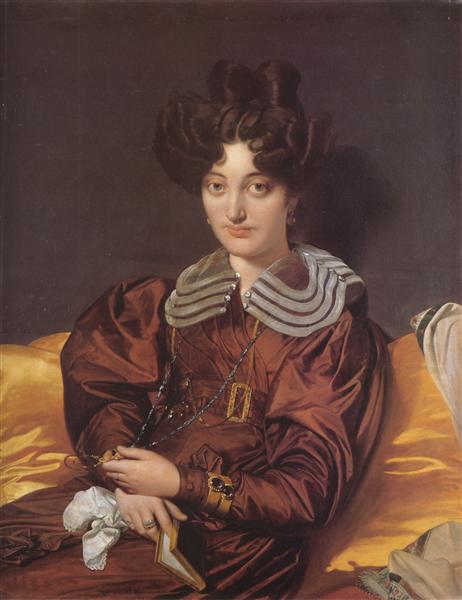Descrizione
L'opera "Ritratto della signora Marcotte de Sainte-Marie" (1826) di Jean-Auguste-Dominique Incom Romanticismo. Questo ritratto, che cattura l'essenza del suo soggetto con una precisione accattivante, presenta la signora Marcotte de Sainte-Marie con un'eleganza e una dignità che sono caratteristiche dello stile di ingresso, che è nota per la sua capacità di unire l'idealizzazione classica con l'ispezione acuta di la psiche umana.
Nel piano compositivo, la figura di Madame Marcotte è centrata e con un cuscinetto verticale, che irradia fiducia e raffinatezza. La scollatura del suo vestito, sottilmente delineato, suggerisce un senso di sensualità contenuto, mentre l'uso di uno sfondo scuro fa risaltare la sua figura, accentuando il contrasto tra le trame dorate e il massimo dei colori che lo circondano. La composizione è notevole per la loro attenzione ai dettagli nei costumi e negli ornamenti, che non solo arricchiscono l'immagine visiva, ma evocano anche lo stato sociale dei rappresentati. Ogni piega tissutale sembra avere una sua vita, mostrando il master per dettagli tecnici che, allo stesso tempo, non distraggono dall'armonia globale del lavoro.
La tavolozza dei colori utilizzata nel ritratto è particolarmente intrigante. I toni caldi e terribili predominano nella rappresentazione dell'abito di Madame Marcotte, creando un'atmosfera accogliente. Ing, fedeli al tuo stile, scegli di applicare strati di vernice che forniscono una luminosità quasi radiosa alla pelle, che non solo porta realismo, ma invoca anche una sensazione di nobiltà e morbidezza che rafforza la delicatezza dei rappresentati. L'opera trasmette una calma serena, in parte grazie all'espressione morbida e contemplativa di Madame Marcotte, che invita gli spettatori a contemplare non solo la bellezza esterna, ma anche gli interni.
Gli occhi dei rappresentati sono un'altra caratteristica evidente che cattura immediatamente l'attenzione. Il reddito è noto per la sua particolare padronanza nella rappresentazione degli occhi e in questo ritratto, questi non solo fungono da semplici finestre per l'anima, ma come elementi chiave che riflettono l'intelligenza e la profondità del personaggio di Madame Marcotte. L'aspetto diretto verso lo spettatore crea una connessione immediata, trasformando la pittura in un dialogo silenzioso tra i rappresentati e chiunque lo osservi.
La storia dietro il ritratto aggiunge anche un elemento di interesse. Realizzato in un momento in cui il ritratto formale era una dichiarazione di identità e status, questo lavoro è presentato non solo come un riflesso della bellezza fisica, ma anche come simbolo del ruolo delle donne nella società del loro tempo. La signora Marcotte de Sainte-Marie, che era una figura eccezionale dell'alta società, è immortalata con una dignità che supera il semplice ritratto, evocando la complessità della vita e le aspettative delle donne durante il diciannovesimo secolo.
Nel contesto più ampio del lavoro d'ingresso, "il ritratto della signora Marcotte de Sainte-Marie" può essere associato ad altre opere dell'artista che mostrano il suo approccio meticoloso al ritratto e alla figura umana, come il "ritratto della duchessa di Broglie "o il" ritratto delle sorelle Pelissier ". Queste opere rivelano il loro impegno per la rappresentazione realistica, esplorando le questioni relative all'identità, alla percezione sociale e all'intimità.
Pertanto, questo lavoro non solo 55 è un esempio estetico del master, ma anche un documento culturale che parla del suo tempo, la natura del ritratto e il ruolo della figura femminile nell'arte. Attraverso le mani di maestre, Madame Marcotte de Sainte-Marie trascende la semplice rappresentazione, diventando un epicentro di formalità, eleganza e rappresentazione riflessiva dell'umanità.
KUADROS ©, una famosa vernice sul muro.
Dipinti ad olio fatti a mano, con la qualità degli artisti professionisti e il distintivo sigillo di KUADROS ©.
Servizio di riproduzione delle immagini con garanzia di soddisfazione. Se non sei completamente soddisfatto della replica del tuo dipinto, rimborsiamo i tuoi soldi al 100%.

